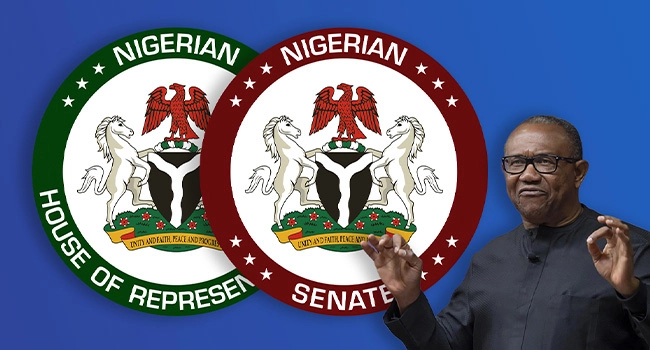After over 20 years of its formation, pro-workers political organisation, Labour Party (LP) seems to be gradually making inroads into mainstream politics as the party has got six Senate and 34 House of Representatives seats in the February 25 National Assembly (NASS) elections.
Relatively obscure in the political arena before now, LP, which was previously known as the Party for Social Democracy (PSD), gained unprecedented popularity with what has been described by many as the Peter Obi phenomenon. The milestone of LP in the just-concluded elections for the red and green chambers is no doubt credited to the fame and acceptance of the party’s flag bearer by an overwhelming youth majority known as ‘Obidients’.
The Chairman of the Independent National Electoral Commission (INEC), Mahmood Yakubu at a meeting with Resident Electoral Commissioners (RECs) on Saturday, said, “In last Saturday’s elections, winners have also been declared for 423 national legislative seats while supplementary elections will be held in 46 constituencies.
“In the Senate, 98 out of 109 seats have been declared. So far, seven political parties have won senatorial seats while in the House of Representatives, 325 out of 360 seats have been won by eight political parties.”
In terms of party representation for the 10th Assembly, the INEC chief said APC won 57 Senate seats; the PDP, 29; LP, 6; SDP, 2; NNPP, 2; YPP, 1; and APGA, 1. For the lower chamber, the electoral chair said the APC has 162 seats; PDP, 102; LP, 34; NNPP, 18; APGA, 4; ADC, 2; SDP, 2; YPP, 1.
Yakubu also said Certificates of Return would be presented to Senators-elect on Tuesday at the National Collation Centre (the International Conference Centre), Abuja, while Members of the House of Representatives-elect would receive theirs the following day, Wednesday at the same venue.
Compared to its phenomenal stride in the 2023 elections, the LP did not get a single seat in the 2019 National Assembly elections. Four years ago, out of the 360 seats in the house, the All Progressives Congress (APC) won the majority seats with over 211 members and the Peoples Democratic Party (PDP) got over 111 members. The other seats were shared amongst the smaller parties.
For the Senate, the APC commanded the Senate majority with 64 senators, trailed by the PDP with 44 and the Young Progressives Party (YPP) with a single seat. The figures have since changed with the series of defections in the 9th National Assembly.
Obi, the trader and former Anambra State governor changing the game and leading the new third force in Nigeria’s political sphere, was able to galvanise the support of millions of youths, especially in southern Nigeria, in less than a year since he moved to the LP from the PDP.
Obi, 61, was adjudged by INEC to have lost the presidential election after having won 12 states, including Lagos and other former strongholds of the two previously dominant parties with a total of 6,101,533 votes. INEC subsequently on Wednesday declared Bola Tinubu of the ruling APC winner of the contest, having scored 8,794,726 votes ahead of Obi; and Atiku Abubakar of the PDP who scored 6,984,520 votes.
Although Obi has vowed to head to court to challenge the results of the presidential poll on the claim that he won the election, citing the failure of the electoral umpire to transmit results electronically, widespread rigging and reports of violence and disruption at many polling units during the poll, many observers would argue that the 2023 NASS election, especially, was a fairly good start for the ‘Obidient’ family.
With the March 11, 2023 governorship and state assemblies’ elections just days away, ‘Obidients’, who seem to be causing a political hailstorm in Nigeria at the moment despite claims of having no structure, are bent on producing LP governors and state assembly members, especially in states where Obi won the presidential poll. Nigerians will be electing 28 state governors come next Saturday in the seasonal poll.
The last and only governor produced by the LP in the last 20 years is Olusegun Mimiko of Ondo State who was in office from February 2009 to February 2017.
Observers are certain the days ahead will be one for the books.

